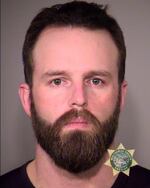
Ryan Payne
Courtesy of the Multnomah County Sheriff's Office
Montana resident Ryan Payne was one of the first people to travel to Harney County earlier this year to help Ammon Bundy take over the Malheur National Wildlife Refuge.
He was also one of the first to plead guilty in the case.
Despite a monthslong effort to withdraw that plea, U.S. District Court Judge Anna Brown said Wednesday that Payne will have to honor his agreement.
READ: Judge Anna Brown's 32-Page Ruling On Ryan Payne's Case
"The court concludes that Payne's desire to withdraw his guilty plea on this record is merely a classic example of 'buyer's remorse,'" Brown wrote in her ruling.
Related: Refuge Occupier Ryan Payne Explains Why He Wants To Reverse Guilty Plea
Payne, a 33-year-old electrician and Army veteran from Anaconda, Montana, had argued that he accepted the plea deal under the impression he would also receive a plea deal for charges he faces in Nevada for his role in a 2014 armed standoff near Cliven Bundy's ranch.
When that deal fell through, Payne argued that he should be allowed to remove the Oregon plea and go to trial.
Brown noted any negotiations in Oregon and Nevada are independent of each other, and do not have bearing on Payne's ability to reject the plea deal.
"Breakdown of the plea negotiations in the District of Nevada does not provide a fair and just reason for the Court to permit Payne to withdraw his guilty plea," the judge wrote.
Payne's attorney, Richard Federico, had also argued information about government informants that surfaced during the trial of Ammon Bundy and other occupation leaders shed new light on his case.
“It has now been revealed that some of the inculpatory conduct and statements attributed to Mr. Payne apparently were made to confidential informants, a fact previously unknown to Mr. Payne,” Frederico wrote in the guilty plea withdrawal filing.
Related: All 7 Defendants Found Not Guilty In Refuge Occupation Trial
“Had Mr. Payne and his counsel been aware of this basis for impeachment of the government’s potential witnesses, they could have evaluated the strength of the government’s case differently,” Federico added.
Brown denied that argument, stating Payne was at all of the key events of the occupation and had a "superior position" to the government when it came to assessing what evidence could have been used against him.
Additionally, she noted withdrawing the guilty plea would create undue "prejudice" against the government, and indeed likely already did in the trial that led to the acquittals the Bundys.
"It is undisputed that Payne was a leader of the occupation," Brown wrote. "Payne's absence from the trial that began September 7, 2016 ... unquestionably affected the government's presentation of evidence and potentially affected the manner in which the juror's assessed the evidence."
Brown noted that at least one juror equated Payne's absence at that trial as a "material hole in the government's case."
Payne's attorney, Lisa Hay, declined to comment.
Kevin Sali, a Portland-based criminal defense attorney not associated with the case, said Brown's ruling is the one he expected. He said the ruling has implication for two other defendants — Joseph O'Shaughnessy and Eric Flores — who have also filed to withdraw their guilty pleas.
"At least in theory, each defendant's case and anybody who wants to withdraw their plea will be looked at individually and on its own facts," he said.
But in reality, Sali said, once a judge rules in a case like this with multiple defendants, it's hard to see how the judge would reach a different conclusion.
"Absent some reason to the contrary, you can usually assume you're going to kind of go that same way for the other defendants, unless there's something really strikingly different about their cases," Sali said.
O’Shaughnessy’s attorney, Amy Baggio, and Flores' attorney, Ernest Warren, Jr., both declined to comment.